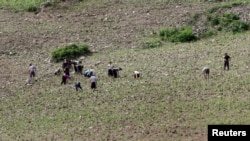Drought-hit North Korea has reduced food distribution, an official of the U.N. Food and Agriculture Organization (FAO) said Thursday.
Cristina Coslet, FAO’s Global Information and Early Warning System officer in charge of Far East Asia, told VOA the North Korean government informed the agency that the country’s food ration for July was 310 grams per person per day, a 25 percent decrease from the previous month. Between January and June 2015, the average food ration was 410 grams per person per day.
Coslet said a severe drought is affecting the country’s crop production.
“We assume that this is mainly because early planted crops - wheat, barley, potato - decreased considerably,” said Coslet in a phone interview with VOA.
Coslet expected this year’s production of potatoes and winter wheat to drop by more than 20 percent from the previous year.
The FAO official said the early season harvest is relatively small, but it is an important food source for North Koreans.
“Spring crops are vital for food security, being an important food source for the lean season, which stretches from May to September,” said Coslet.
Coslet added, however, that it is still too early to estimate the final harvest, as rainfall in the coming weeks is crucial.
Despite the dismal forecast, the communist country is not known to have sought food assistance from U.N. agencies or Western countries.
The United States said this week it has not received a request from the North for food aid.
“The United States remains deeply concerned about the well-being of the North Korean people. North Korea has not requested United States assistance, and the U.S. has no plans to prove humanitarian assistance to North Korea at this time,” said Katina Adams, State Department East Asia-Pacific spokesperson.
According to the FAO, North Korea is having unusually dry weather this year, with rainfall well below average. The drought that bean in the spring is drying up the country’s irrigation water supplies, including dams, wells and reservoirs.
Last month, the North’s official media admitted that the country has been hit with “the worst drought in 100 years” and it is “causing great damage” to the country’s agricultural fields.




